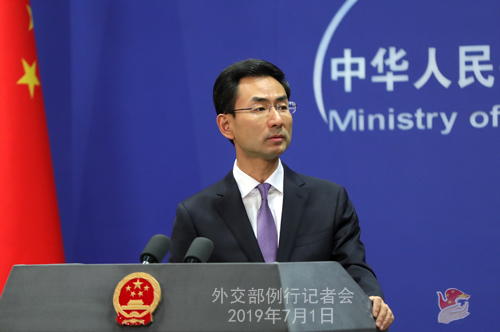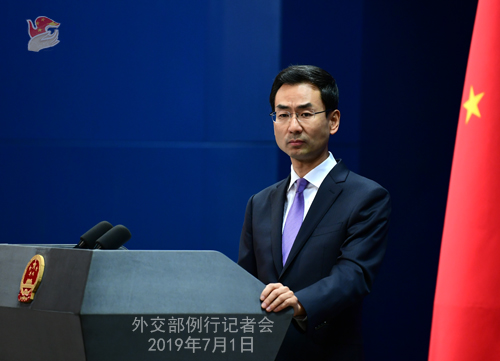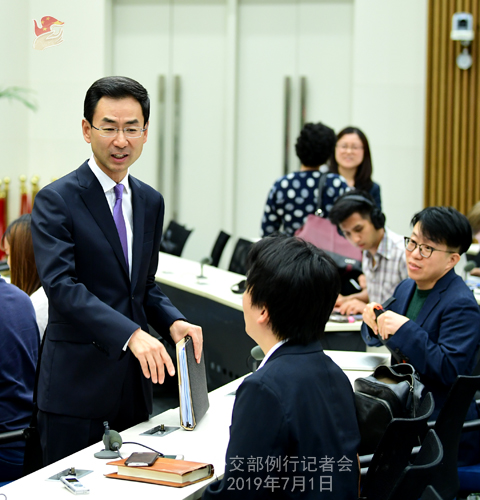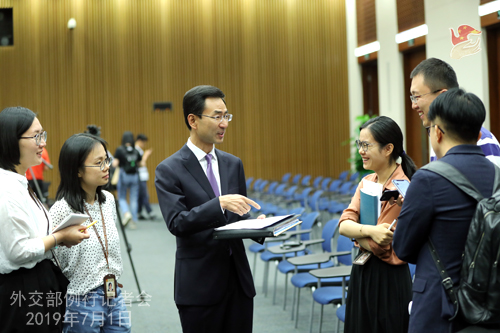| Foreign Ministry Spokesperson Geng Shuang's Regular Press Conference on July 1, 2019 |
| 2019-07-01 20:42 |
|
Q: The leaders of the DPRK, the US and the ROK held the first meeting at the Demilitarized Zone between North and South Korea yesterday afternoon. What's your comment? What role did China play in facilitating this meeting? Do you have anything to say for what's going to happen next? A: Yesterday afternoon, Chairman Kim Jong Un and President Trump crossed the military demarcation line that divides North and South Korea and met each other in Panmunjom. The friendly meeting between the leaders of the DPRK, the US and the ROK deserves applause. This is a constructive meeting with positive outcomes. In particular, it is of important significance for the DPRK and the US to decide to restart their talks at the working level in the near term. China supports this. China always stays committed to the denuclearization of the Korean Peninsula, upholding peace and stability there and resolving the issue through dialogue. President Xi Jinping's recent successful visit to the DPRK has injected new impetus into the political settlement process of the Peninsula issue. The interaction between the DPRK, the US and the ROK is in their common interests and meets the widespread aspiration of the international community. Under the current circumstances, we hope relevant parties will seize opportunities, meet each other halfway, explore effective ways to resolve each other's concerns and work for new progress in the denuclearization and political settlement process of the Korean Peninsula. Q: On Saturday, President Xi and President Trump held a very successful meeting. They agreed to restart the trade talks process. Can you give us any other details on that? For example, when might we expect to see these talks restarted? Are we going to get a US delegation visiting here soon? Or will the Chinese delegation go to the US soon? A: Like you said, the Chinese and US heads of state held a successful meeting in Osaka, during which they agreed to restart trade consultations on the basis of equality and mutual respect. The US said it decided not to add new tariffs on Chinese goods. The two teams will hold discussions on specific issues. I'd refer you to the competent authority for more details. Q: Some 80 US experts on Asian affairs, including former acting Assistant Secretary of State Susan Thornton and former US ambassador to China J. Stapleton Roy, are planning to send an open letter to President Trump and the Congress. According to media reporters who have seen the draft letter, it said that many US actions are contributing to the downward spiral in relations and that the "US efforts to treat China as an enemy and decouple it from the global economy will damage America's international role and reputation and undermine the economic interests of all nations". Would you like to comment on that? A: We note the reports. If media revelations are accurate, we commend the rational voice in the draft open letter. President Xi and President Trump just held a successful meeting on the sidelines of the G20 Osaka Summit. The most important consensus they reached is to advance China-US relations featuring coordination, cooperation and stability. The two sides announced that trade consultations will be restarted on the basis of equality and mutual respect. The important agreement pointed out the right direction forward for bilateral relations, eliciting a strong response in China, the US and beyond. It is further testament that a sound China-US relationship is the shared wish of people in both countries and the wider world. Just as President Xi said about what can be learned from the past 40 years of bilateral relations between China and the US, both stand to gain from cooperation and lose from confrontation. Cooperation and dialogue is better than friction and confrontation. With highly-intertwined interests and broad scope for cooperation, China and the US should avoid the pitfall of conflict and confrontation, and seek mutually-reinforcing and shared development. It is our belief that as long as both sides follow the principles and direction set by our leaders, expand cooperation on the basis of mutual benefit, manage differences with mutual respect, and properly handle existing and potential issues, we will be able to realize the steady and sustained development of bilateral relations to bring more benefits to people of both countries and beyond.
Q: President Trump has tweeted that US-China trade talks were back on track and that Huawei could import components that may not harm US national security from US companies. He also promised no further tariffs. So what concessions were made by the Chinese side to arrive at this particular development? A: During this meeting, the two heads of state exchanged views on fundamental issues in bilateral relations. As I just said, the most important consensus reached is to advance China-US relations featuring coordination, cooperation and stability. It serves the interests of both sides and is the shared expectation of the international community. The two sides agreed to restart trade talks and the US decided not to add new tariffs on Chinese exports. This is also in the interests of both. As China has repeatedly emphasized and as the US knows clearly, trade wars and tariffs can only harm others and oneself instead of solving any problems. Q: According to reports, Tsai Ing-wen will be transiting the US twice this month for a total of four days, which may be the longest time she has ever spent in the US. Has the Chinese government already complained to the US about this? Is China asking the US not to allow Tsai Ing-wen to transit the US? A: China always opposes official interactions between the US and Taiwan. This position is firm and clear. We urge the US to honor its commitment to the one-China principle and the three China-US joint communiques, not allow Tsai to transit and properly handle issues relating to Taiwan to prevent damaging China-US relations and peace and stability across the Taiwan Straits. China has expressed concerns and lodged stern representations to the US side. Q: A follow-up question on the China-US trade talks. Is there a timetable for continuing negotiation? Previously the foreign ministry said that to restart the trade talks, both sides should take a friendly and sincere attitude. Does China think that right now the US side has a sincere attitude to restart talks? A: As I just said, the two sides agreed to restart trade consultations on the basis of equality and mutual respect. The basis here, equality and mutual respect, is very important. As to how to restart the talks and specific plans afterwards, like I said, the two teams will hold discussions on them.
Q: According to reports, the US and the DPRK will begin talks on denuclearization. What will China do to promote the denuclearization of the Korean Peninsula? A: I think I just made clear China's position on the Korean Peninsula issue. China stays committed to the denuclearization of the Korean Peninsula, upholding peace and stability there and resolving the issue through dialogue. This position is known to all. Our position is rock solid and clear-cut. All relevant parties, including the US and the DPRK, know that very well. Under the new circumstances, China stands ready to step up communication and coordination with all relevant parties for new progress in the denuclearization and political settlement process of the Korean Peninsula. Q: British Foreign Secretary Jeremy Hunt said in a statement that recent social activities in Hong Kong made it even more important to reiterate Britain's commitment to the Sino-British Joint Declaration. The statement also said that this document is a legally-binding treaty and remains valid today. What's your response? A: We have repeatedly stated our position on this matter. Let me reiterate, the Joint Declaration resolved the Hong Kong issue, which was left over by history. As Hong Kong returned to the motherland and work relating to the transitional period came to an end, the rights and obligations of the British side under the declaration were completely fulfilled. On July 1, 1997, China resumed sovereignty over Hong Kong and the Chinese government started administering it in accordance with the Constitution and the Basic Law. The UK no longer has any responsibility for Hong Kong. Hong Kong affairs are purely China's internal affairs that brook no foreign interference. I would also like to stress that China deplores and strongly rejects the frequent British interference in and criticism of Hong Kong affairs. We advise the UK to know its place, stop meddling in Hong Kong affairs in any form and do more for its prosperity and stability rather than the opposite.
|
 |
|



